Overview:
The American Diabetes Association Standards of Care 2025 provide a comprehensive framework for healthcare providers to effectively manage diabetes through personalized treatment plans that consider individual patient needs, including their mental health and social determinants of health. This is supported by the article's emphasis on the importance of tailoring care to diverse populations and leveraging technology, thereby ensuring that healthcare professionals can deliver evidence-based, holistic approaches to improve health outcomes for individuals with diabetes.
Introduction
The 2025 American Diabetes Association (ADA) Standards of Care in Diabetes serve as a pivotal guideline for healthcare professionals dedicated to managing diabetes effectively. These standards encompass a wide array of topics, including:
- Prevention
- Diagnosis
- Treatment
- Ongoing management strategies
All aimed at promoting evidence-based care. With a focus on individualized treatment plans, the guidelines emphasize the importance of tailoring approaches to meet the unique needs of diverse patient populations.
Additionally, the integration of mental health considerations and the acknowledgment of social determinants of health are highlighted as critical components of comprehensive diabetes management. As healthcare providers navigate these updated standards, they are equipped to enhance patient outcomes and foster sustainable health practices, ultimately improving the quality of care for those living with diabetes.
Overview of the 2025 ADA Standards of Care in Diabetes
The American Diabetes Association Standards of Care 2025 for managing blood sugar conditions represent a crucial framework for healthcare providers tasked with effective management. These guidelines cover a broad spectrum of topics, including prevention, diagnosis, treatment, and ongoing management strategies, all designed to facilitate evidence-based care. For instance, it is recommended to consider setting an A1C goal of <6.5% for most children and adolescents with type 2 conditions who have a low risk of hypoglycemia.
By adhering to the American Diabetes Association Standards of Care 2025, healthcare professionals can ensure that individuals receive tailored treatment that specifically addresses their needs. According to the American Diabetes Association Professional Practice Committee, 'This condition is classified conventionally into several clinical categories (e.g., type 1 or type 2 forms, gestational diabetes mellitus, and other specific types derived from other causes, such as monogenic disorders, exocrine pancreatic issues, and high-risk medications).' Moreover, the American Diabetes Association Standards of Care 2025 emphasize the importance of a comprehensive strategy for addressing diabetes, which includes not only the physical health of the individual but also their psychological and social wellness.
This comprehensive viewpoint is essential in optimizing health outcomes and fostering sustainable health practices. The case study titled 'A1C Goals for Youth with Type 2 Diabetes' further illustrates the importance of individualized treatment plans, emphasizing that for those at higher risk of hypoglycemia, A1C goals should be tailored as clinically appropriate. As T2DSolutions launches, it aims to provide valuable resources and support for individuals seeking to understand and implement the American Diabetes Association Standards of Care 2025 effectively.
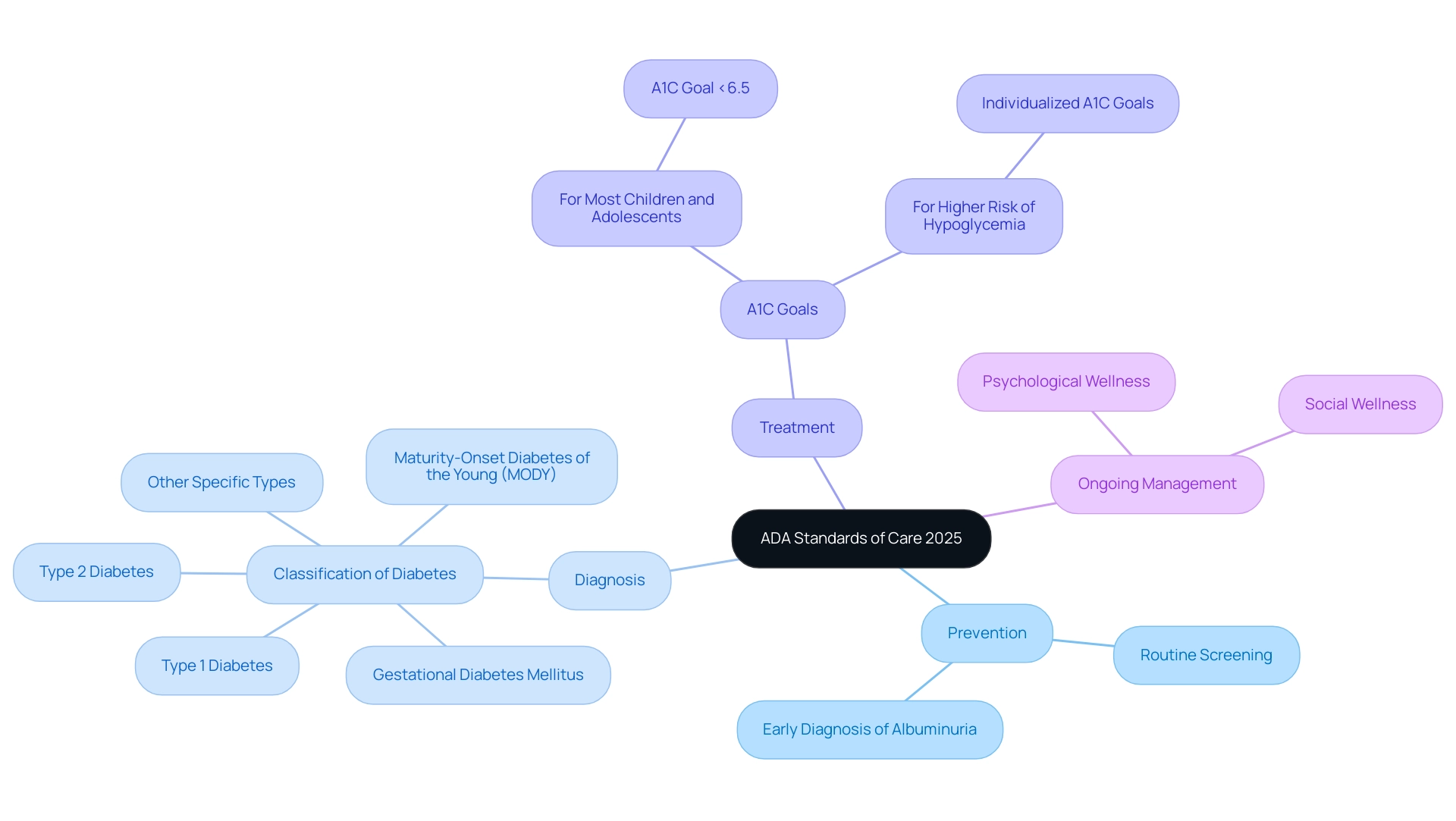
Key Updates and Revisions in the 2025 Standards of Care
As T2DSolutions launches as a comprehensive resource hub for education on blood sugar conditions, it is essential to highlight the significant updates introduced in the American Diabetes Association standards of care 2025 for effective care. Key among these updates is the enhancement of personalized treatment plans tailored to meet the unique needs of each patient. This method is essential, as it acknowledges the various elements affecting glucose management, including the concerning statistic that rates of major amputations related to this condition are elevated in individuals from racial and ethnic minoritized groups, emphasizing disparities in treatment.
Furthermore, the revised guidelines emphasize the significance of incorporating mental health into the management of blood sugar conditions. Research suggests that both mental well-being and metabolic health outcomes are connected; therefore, addressing psychological factors is crucial for holistic treatment. The American Diabetes Association Professional Practice Committee emphasizes,
Individuals who have experienced DKA should not be treated with SGLT inhibition,
highlighting the necessity for providers to stay informed about medication guidelines.
Additionally, the standards advocate for a deeper understanding of social determinants of health, as these external factors significantly influence care and patient outcomes. Significantly, glycemia reduction in type 2 diabetes has been associated with enhanced microvascular and cardiovascular results, highlighting the advantages of effective control. The case study on SGLT inhibition and the risk of DKA further illustrates the need for education on DKA signs and management for individuals at risk.
Healthcare providers are encouraged to familiarize themselves with the American Diabetes Association standards of care 2025 updates to align their practices with the latest evidence-based recommendations, ensuring optimal care for their patients. T2DSolutions is committed to providing the necessary resources and support to help both patients and healthcare providers navigate these important updates.
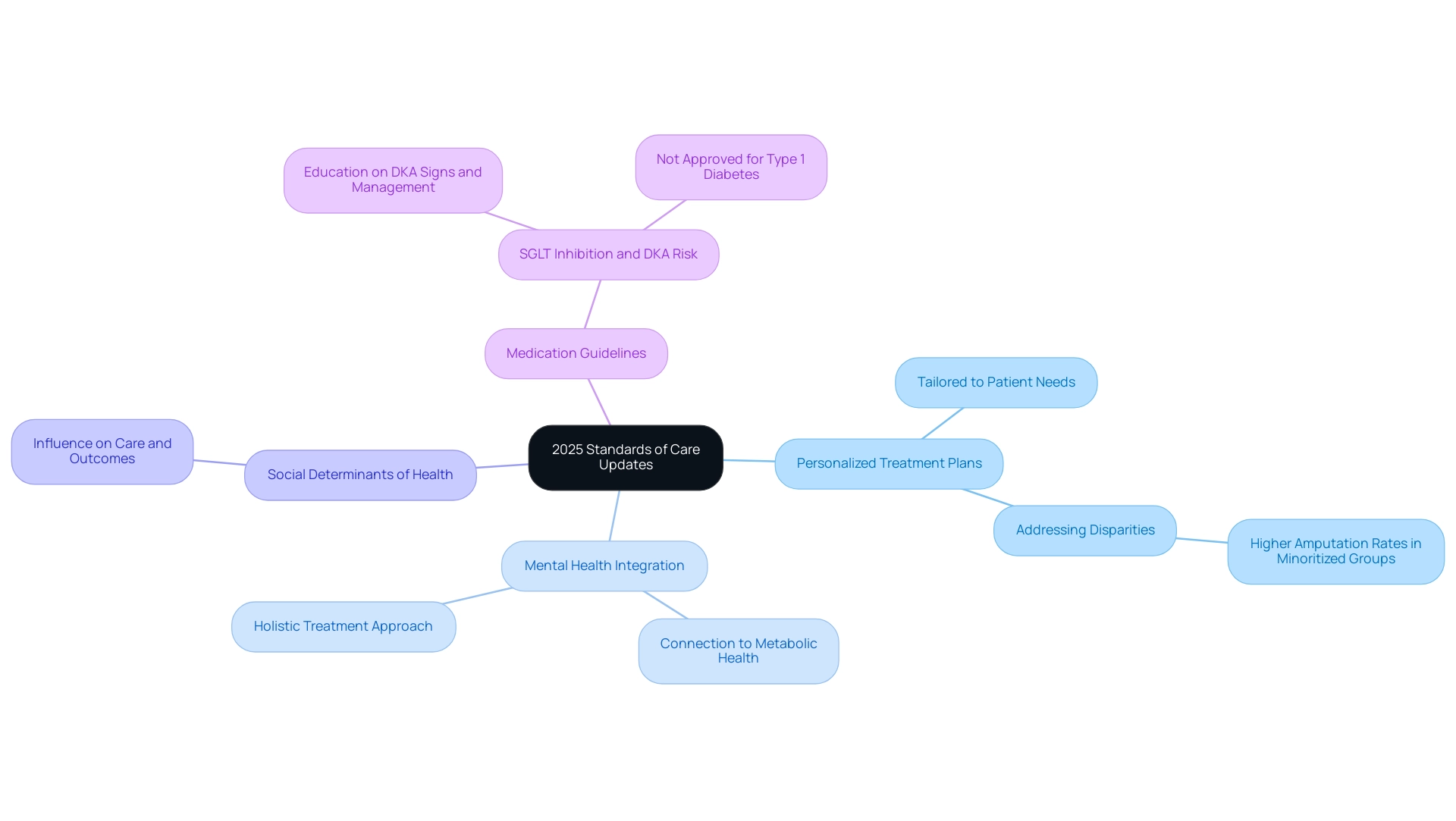
Improving Health Outcomes: Focus Areas in the 2025 Standards
As we launch T2DSolutions, a new resource hub dedicated to Type 2 and Type 3 health education and community support, it's essential to highlight the American Diabetes Association Standards of Care 2025. These guidelines underscore several vital focus areas essential for enhancing health outcomes in diabetes care, including glycemic control, as outlined in the American Diabetes Association Standards of Care 2025, which is imperative for minimizing the risk of complications associated with diabetes. Regular monitoring of HbA1c levels is recommended, as it serves as a critical indicator of long-term glucose control.
In fact, cumulative multimorbidity and inadequate glycemic control have been associated with hypoglycemia-related emergency visits, highlighting the need for effective cardiovascular risk management strategies tailored for individuals with diabetes. As Ketan Dhatariya observes, 'Insulin continues to be the most effective method to manage hyperglycemia in the inpatient environment, particularly in those who are critically ill.' This authoritative insight emphasizes the importance of insulin in managing glycemic control.
At A2D Solutions, we advocate for patient education and joint decision-making between healthcare providers and patients to encourage a collaborative approach to treatment.
For instance, the case study titled 'Gunst et al.' conducted in an ICU setting demonstrated no difference in mortality, underscoring the significance of implementing effective glycemic control strategies. Incorporating lifestyle modifications, such as dietary changes and increased physical activity, is essential in this process.
By concentrating on these focus areas and utilizing the resources available at T2DSolutions, healthcare professionals and the community can significantly improve the quality of care and health outcomes for individuals living with this condition.
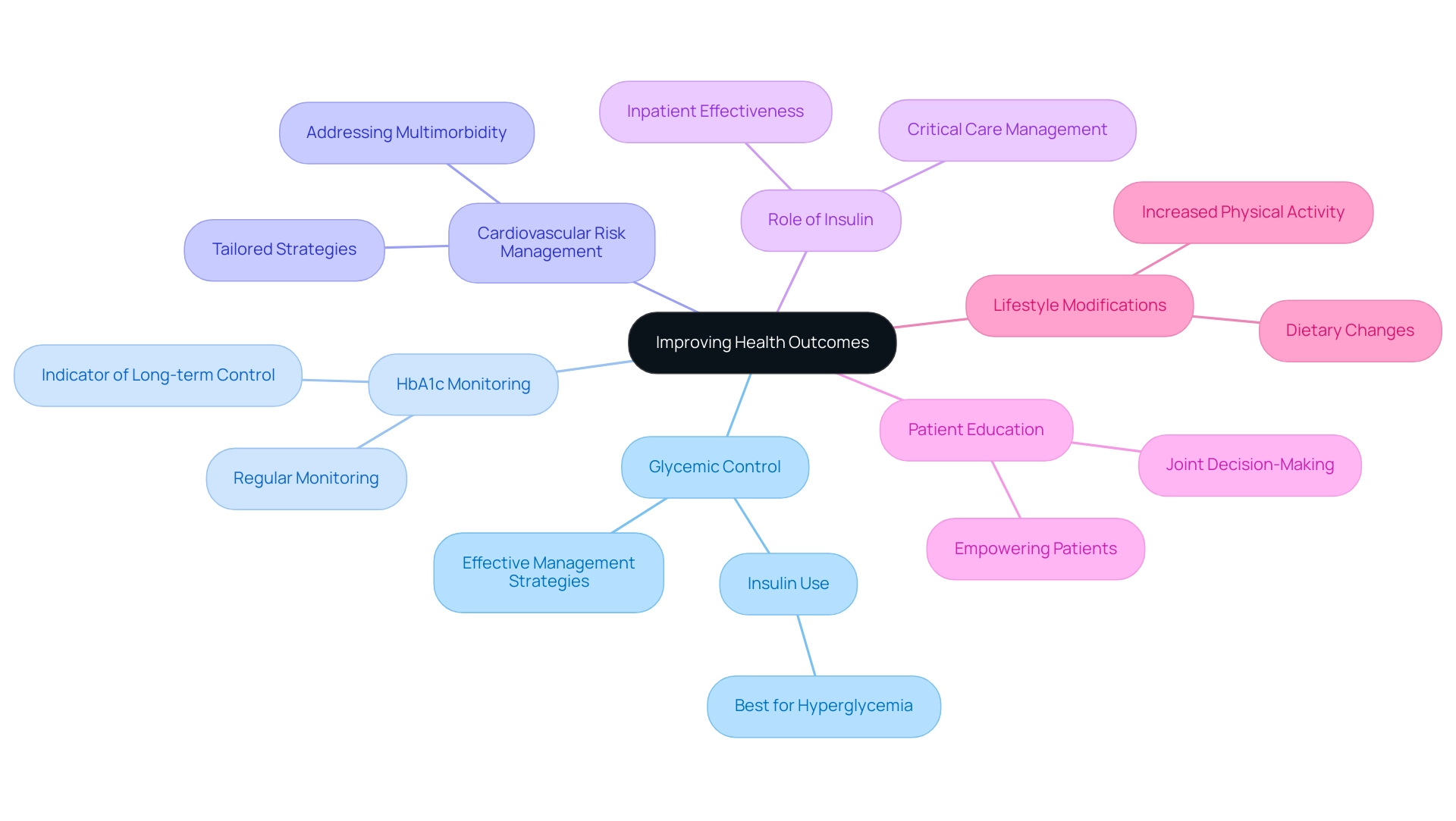
The Role of Technology in Diabetes Care: Insights from the 2025 Standards
Td Solutions is proud to announce our commitment to offering extensive resources for Type 2 and Type 3 blood sugar control. Our platform will provide a range of educational materials, including articles, videos, and guides customized for those recently diagnosed. The incorporation of technology in blood sugar control is emphasized in the American Diabetes Association standards of care 2025, particularly focusing on the use of continuous glucose monitoring (CGM) devices, insulin pumps, and mobile health applications.
These advanced tools play a crucial role in real-time data collection, enabling individuals to monitor their glucose levels more effectively and modify their strategies accordingly. With 96% of reported cases of this condition being Type 2 in 2021, the urgent need for effective management solutions has never been clearer. Our platform will support the surge in CGM usage, empowering patients to enhance their self-management capabilities through community forums and peer support.
Providers are strongly encouraged to familiarize themselves with the variety of technological solutions available, as the landscape of managing diabetes-related health issues rapidly evolves. The expected expansion of the market for AI health technologies, coupled with a projected increase in the prevalence of diabetes-related conditions, requires a comprehensive strategy to effectively incorporate AI-driven tools into management.
As noted by MD. Jamal Hossain, a lead author on related studies, 'this manuscript is an honest, accurate, and transparent account of the study being reported; that no important aspects of the study have been omitted; and that any discrepancies from the study as planned have been explained.' This reflects the advancements in this field, presenting opportunities for significant benefits, though challenges in clinical integration remain. Additionally, a case study titled 'Conclusion on AI-Driven DSS in Diabetes Care' highlights that while AI-driven tools can provide substantial benefits, their integration into clinical practice poses ongoing challenges that must be addressed.
By actively integrating these technologies into patient support strategies, healthcare providers can promote better health results and enable patients in their condition oversight journey. Through T2DSolutions, we aspire to be your reliable source for navigating these advancements in managing health.
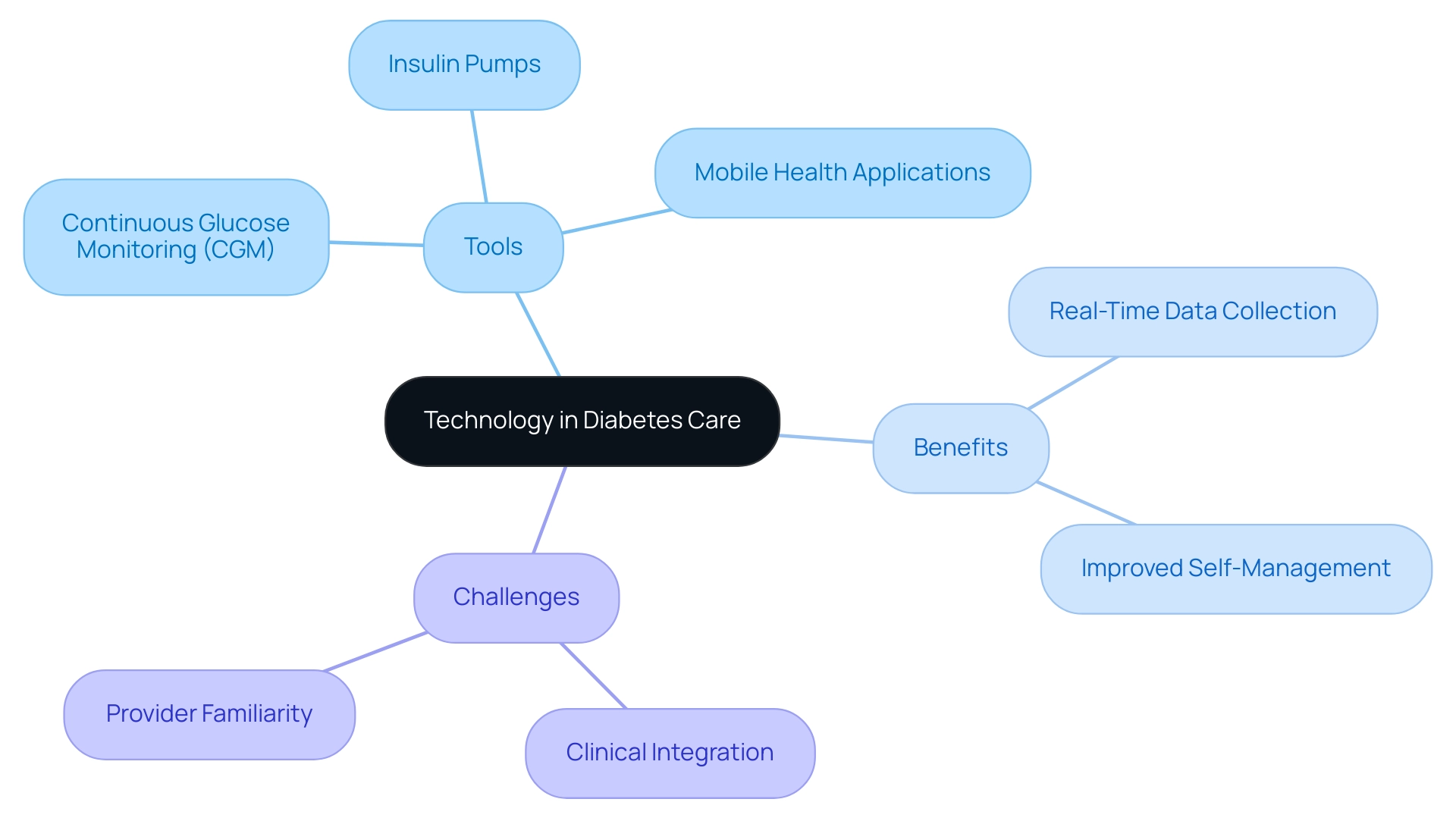
Tailoring Diabetes Care: Considerations for Diverse Patient Populations
As T2DSolutions launches as a comprehensive resource hub for Type 2 and Type 3 health conditions, it aligns with the American Diabetes Association standards of care 2025, which emphasize the critical need for personalizing support to address the distinctive needs of diverse populations, including children, older adults, and pregnant women. Each of these groups presents unique risk factors, treatment responses, and support requirements that must be considered in the development of individualized care plans. T2DSolutions seeks to offer valuable resources and assistance to recently diagnosed individuals, including:
- Educational materials
- Access to healthcare experts
- Community support groups
This fosters effective communication and cultural competence in health care.
The CDC’s Division of Diabetes Translation (DDT) program emphasizes that its overall goals are to diminish the preventable burden of this condition via various measures, such as:
- Public health leadership
- Partnership
- Research
- Programs
- Policies that convert science into practice
Furthermore, statistics indicate educational disparities, with only:
- 68.2% of non-Hispanic whites
- 56.0% of non-Hispanic blacks
- 40.3% of Hispanics
- 73.9% of non-Hispanic Asians
achieving education beyond high school. This demonstrates the necessity for culturally aware approaches in the treatment of blood sugar issues.
A study named 'Emergency Department Utilization Among Underserved Patients' shows that Hispanic and African-American individuals with type 2 conditions often face obstacles to treatment, leading to more emergency visits. The findings suggest that these populations face barriers to care that lead to increased emergency department visits, highlighting the necessity for improved access to primary care and the involvement of multidisciplinary teams to ensure comprehensive diabetes management strategies are effectively implemented across all demographics.
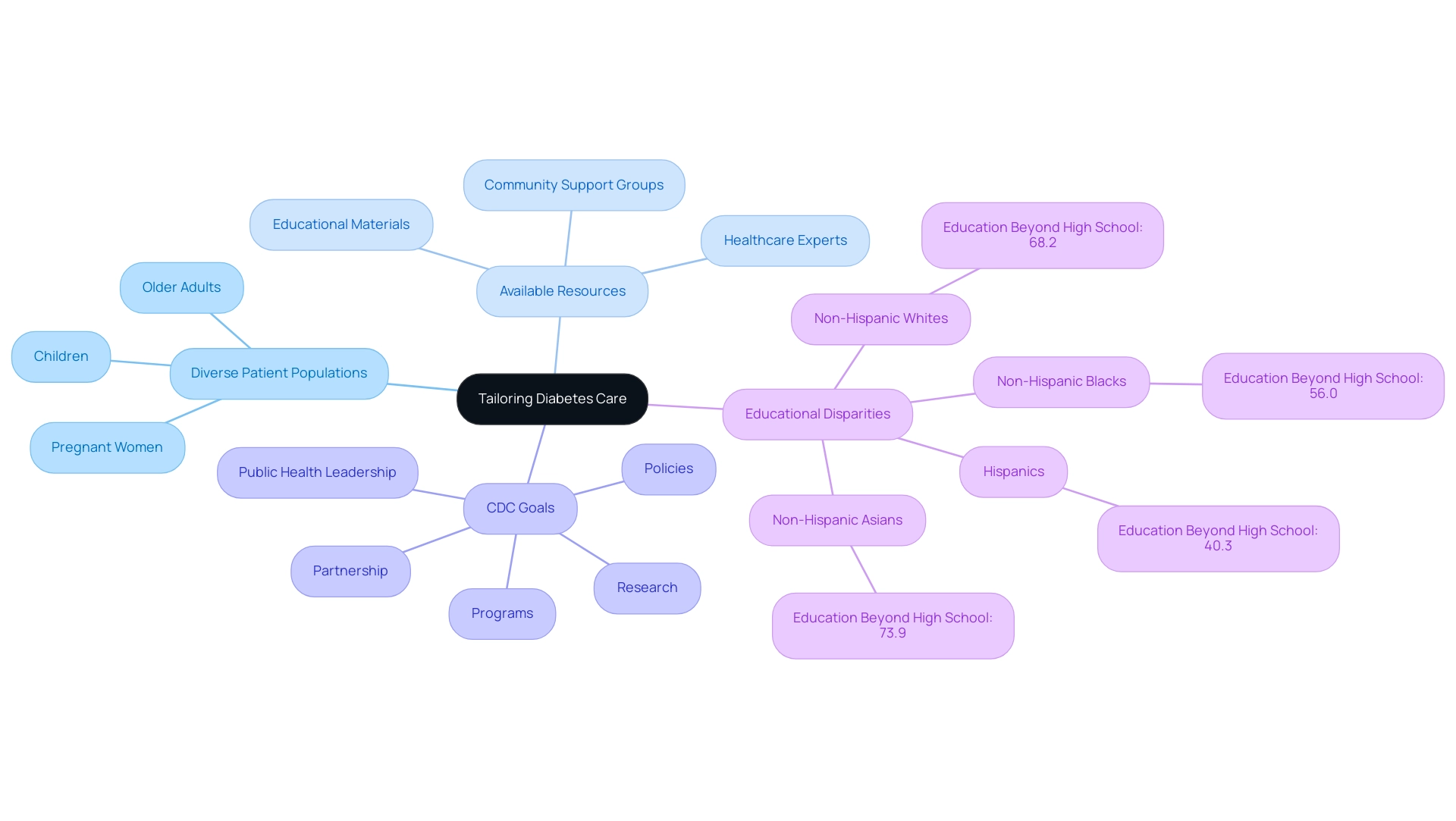
Conclusion
The 2025 American Diabetes Association Standards of Care present a comprehensive framework that emphasizes the importance of personalized approaches in diabetes management. These guidelines address critical areas such as:
- Prevention
- Diagnosis
- Treatment
- Ongoing management
This ensures that healthcare providers can deliver evidence-based care tailored to the unique needs of each patient. The highlighted emphasis on individualized treatment plans is crucial, especially given the disparities in diabetes care experienced by various racial and ethnic groups.
Moreover, the integration of mental health considerations and social determinants of health into diabetes management is vital for optimizing patient outcomes. As the research indicates, addressing these aspects not only enhances the overall quality of care but also acknowledges the intricate relationship between psychological well-being and diabetes management. Healthcare professionals are encouraged to stay informed about these updates and utilize them to improve care strategies effectively.
The role of technology in diabetes management is also a significant focus of the 2025 standards. The adoption of tools such as:
- Continuous glucose monitoring
- Mobile health applications
can empower patients and enhance self-management capabilities. By leveraging these technological advancements, healthcare providers can foster improved health outcomes for individuals living with diabetes.
In conclusion, the 2025 ADA Standards of Care represent a pivotal step forward in diabetes management, advocating for a holistic and individualized approach. As T2DSolutions aims to support the implementation of these guidelines, it is essential for healthcare professionals and patients alike to engage with these resources actively. By prioritizing personalized care, addressing mental health, and embracing technology, the potential for enhancing the quality of life for those living with diabetes is within reach.



